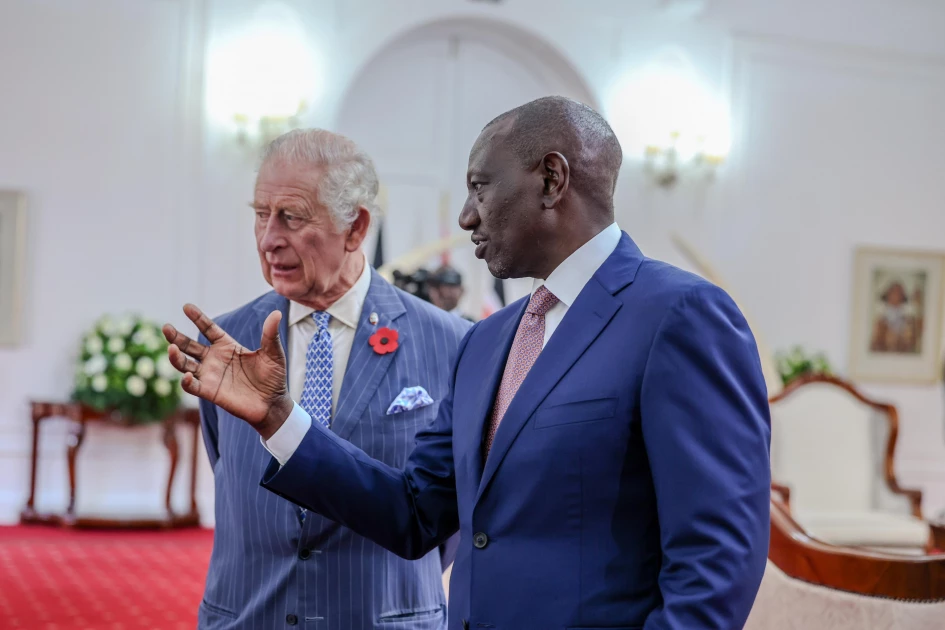‘Much remains to be done,’ President Ruto tells King Charles on British colonial brutality

President William Ruto with King Charles III at State House, Nairobi. PHOTO| PCS
Addressing attendees at a State Banquet in honour of King Charles III and Queen Camilla, the President said Kenyans cannot live as prisoners of the past but would not turn their backs on historical actions and omissions.
He however commended King Charles for his expression of willingness to acknowledge the painful aspects of shared history between the two countries saying that while there have been efforts to atone for the death, injury and suffering inflicted on Kenyan and Africans by the colonial government, much remains to be done in order to achieve full reparations.
"Formal British presence in Kenya was proclaimed in 1897 by an order-in-council, which inaugurated European settlement and the displacement, dispossession and disenfranchisement of native Africans, paving the way for brutal colonialism... We cannot live as prisoners of the past. Neither can we go far into the future if we turn our backs on historical actions and omissions whose legacies encumber our present,” he stated.
“While there have been efforts to atone for the death, injury and suffering inflicted on Kenyan Africans by the colonial government, much remains to be done in order to achieve full reparations,” President Ruto noted.
On his part, King Charles III acknowledged the painful past and especially the pain inflicted on Kenyans in the struggle for freedom more than 60 years ago.
The King, who spoke after President Ruto at the State Banquet, said he is seeking to better understand Kenya's painful past and will interact with communities affected.
“It is the intimacy of our shared history that has brought our people together. However, we must also acknowledge the most painful times of our long and complex relationship. The wrongdoings of the past are a cause of the greatest sorrow and the deepest regret,” said the King.
“In coming back to Kenya, It matters greatly to me that I should deepen my own understanding of these wrongs and that I meet some of those whose lives and communities were grievously affected,” he said.
The remarks by the two leaders come amidst calls to have King Charles apologise for the excesses of British colonial rule on Kenyans.
UK High Commissioner Neil Wigan, speaking on Citizen TV’s JKLive show last week remained coy on whether the King will actually offer a personal apology for the brutality meted on Kenyans during the period, rather stating that the country had always “expressed regret” over the issue.
On his first day visit to Kenya, the King visited the Uhuru Gardens National Monument and Museum, where the King and President Ruto laid a wreath in honour of independence-era freedom fighters.
The royalty was also taken through the country's pre and post-independence un-edited history, which included visiting a camp of martyrs, that symbolizes a place of remembrance, healing and renewal.
His Majesty and President Ruto then laid wreaths at the Tomb of the Unknown Warrior, dedicated to honour freedom fighters and liberators who contributed to Kenya’s unity, peace and liberty.
Want to send us a story? SMS to 25170 or WhatsApp 0743570000 or Submit on Citizen Digital or email wananchi@royalmedia.co.ke
Comments
No comments yet.


Leave a Comment